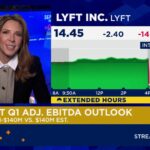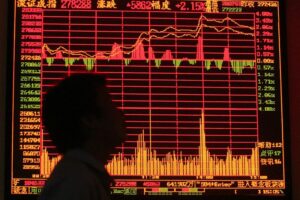
U.S. stocks were higher for a third day Wednesday, even as the presidential race between President Donald Trump and former Vice President Joe Biden looked too close to call in a number of states.
With the votes still being counted, the Federal Reserve began its two-day policy meeting with a statement expected Thursday, while economic data showed a smaller rise in U.S. private sector employment in October than the previous month.
How are stock benchmarks performing?
The Dow Jones Industrial Average DJIA, +1.64% rose 550 points, or 2%, to trade near 28,032, while the S&P 500 SPX, +2.38% was up 89 points, or 2.7%, at about 3,458. The Nasdaq Composite COMP, +3.73% jumped 419 points, 3.7%, to about 11,576. Those level’s were off the session highs.
On Tuesday, the stock market closed sharply higher, with the Dow rallying 554.98 points, or 2.1%, to 27480.03, its biggest one-day point and percentage gain since July 14. The S&P 500 rose 58.92 points, or 1.8%, to 3,369.16. The Nasdaq rose 202.96 points, or 1.9%, to 11,160.57.
Read: The Dow is on pace for its strongest post–Election Day rally in 120 years
What’s driving the market?
Wall Street warmed to the possibility of a divided U.S. government and further political gridlock in Washington following the election, potentially keeping Trump administration’s tax cuts in place no matter who sits in the White House.
A few key states now will determine a 2020 U.S. presidential race that has turned out to be far closer than pollsters and market participants had expected, with a number of states still counting votes Wednesday.
Vote counting in Pennsylvania, Michigan and Wisconsin was expected to stretch into late Wednesday, with both candidates having a path to secure the necessary 270 electoral college votes, and requests for recounts and legal challenges already looming.
Live blog: Trump campaign to ask for Wisconsin recount as election goes into overtime
Markets dropped during the legal contest over the vote between former Vice President Al Gore and George W. Bush in 2000, but some uncertainty may have been priced into stocks in the past month.
“I think the market’s reaction is rational, in the sense of how it’s reacting by sectors,” said David Bianco, chief investment officer, Americas at DWS Group, pointing to rising shares in the technology and health-care sectors, leading all three major stock benchmarks higher on Wednesday.
“The big question overall is, does the market belong here, given that the election hasn’t been finalized?” he said. “At this moment, cash is not trash. Cash is a fine place to be.”
The election results thus far have diminished the likelihood of a so-called Blue Wave, where a Democrat takes the White House and the party takes control of both chambers of Congress which may have been key to another large round of fiscal aid for workers and American businesses.
But for all the rancor in Washington and the possibility of a dragged-out contest, Senate Majority Leader Mitch McConnell (R-Ky) switched gears on Wednesday, saying that a new fiscal stimulus bill is the top priority to help households and businesses battered by the pandemic when the Senate returns next week.
“McConnell said he is not opposed to a stimulus package if it’s needed,” Quincy Krosby, chief market strategist at Prudential Financial, told MarketWatch. “He’s prepared to work toward delivering it, if it’s needed.”
“The concern,” said Krosby, is that the U.S. will follow Europe’s lead and enact new restrictions in an effort to thwart rising COVID-19 cases. “If we have new restrictions, or self-imposed restrictions, that’s going to impact the employment landscape and stimulus is going to be needed.”
Meanwhile a divided government might be just the tonic for markets in a tumultuous year. “Familiarity is what Wall Street likes. Wall Street likes to be able to understand what’s going on. It’s uncertainty Wall Street doesn’t like,” said Sam Stovall, chief investment strategist at CFRA.
The surge higher Wednesday was lead by technology stocks, which benefitted from online shopping and the work-from-home trend during the coronavirus pandemic, and the rise in the tech-heavy Nasdaq index may also point to investor relief that a solidly Democratic government won’t likely be able to regulate big technology giants like Amazon.com Inc. AMZN, +5.93% or Google GOOG, +5.66% GOOGL, +5.95% or raise corporate taxes, analysts said.
Americans went to the polls Tuesday under the shadow of a resurgence in the coronavirus pandemic, with an alarming increase in cases nationwide and the number of people hospitalized with COVID-19 reaching record highs in a growing number of states.
See: Coronavirus update: ‘The pandemic is far from over,’ says NIH director
“This new wave is worse than what we saw in March,” CFRA’s Stovall said. “The real question is what kind of impact will it have on the economy and corporate profits and expectations.”
Meanwhile, the market is speculating that it might get the best of both worlds, said Michael Reynolds, investment strategy officer at Glenmede, pointing to Biden’s slight edge in the White House race, but a tally that could lead to a Republican majority in the Senate. “That means a tax increase may not be accomplishable,” Reynolds said. “Trade relations may be more normalized.”
U.S. economic data reported Wednesday was mixed. A monthly report on private employment from Automatic Data Processing, a precursor to the closely watched Labor Department report on Friday, was much weaker than expected, showing 365,000 jobs were created in October, versus expectations for a gain of 600,000.
Separately, the international trade deficit dropped in September.
But two readings on the services sector were mixed: one from IHS Markit showed the fastest pace of growth since 2015 while a more closely followed report from the Institute of Supply Management, the ISM services index, was at its slowest since May.
Read: Market volatility: Here’s what a contested election would mean for stocks, bonds and the dollar
Which stocks are in focus?
- Ride-share companies saw their stocks surge Wednesday after winning a legislative fight in California that allows them to classify drivers as independent contractors, not employees. Shares of Uber Technologies UBER, +13.40% and Lyft LYFT, +11.32% were both up more than 9%.
- Wendy’s Co. WEN, -5.79% shares were down 5% after missing Wall Street expectations for Q3 revenues.
- Hilton Worldwide Holdings Inc. HLT, +3.15% swung to a profit in the most recent quarter, the company said before the bell. Shares were more than 4% higher.
- Bank stocks fell along with bond yields. Shares of J.P. Morgan Chase & Co. JPM, -2.66% were down 2.1%, Bank of America Corp. BAC, -3.64% shares slid 2.9%, and Citigroup Inc. C, -2.95% shares were down 2.1%.
What are other markets doing?
The yield on the 10-year Treasury note TMUBMUSD10Y, 0.771% tumbled about 10 basis points to 0.77%, as investors rethought the “reflation trade.” Yields and debt prices move in opposite directions.
The Stoxx 600 Europe Index SXXP, +2.05% jumped 2.1%, while London’s FTSE 100 UKX, +1.66% was up 1.7%.
Oil futures rose, with the U.S. benchmark CL.1, +3.63% up 4.1% to $39.18 per barrel, while gold futures GC00, -0.55% slumped 0.7% to settle at $1,896.20 as prospects for the type of large fiscal spending package favored by Democrats faded.
The ICE U.S. Dollar Index DXY, -0.14%, a gauge of the currency against a basket of six major rivals, was down 0.1%.
MarketWatch has launched ETF Wrap, a weekly newsletter that brings you everything you need to know about the exchange-traded sector: new fund debuts, how to use ETFs to express an investing idea, regulations and industry changes, inflows and performance, and more. Sign up at this link to receive it right in your inbox every Thursday.
Mark DeCambre contributed reporting














